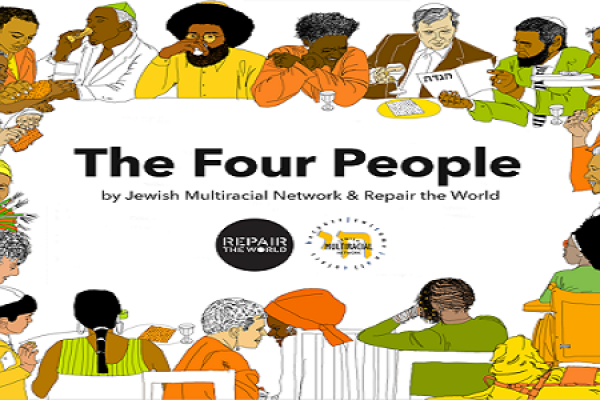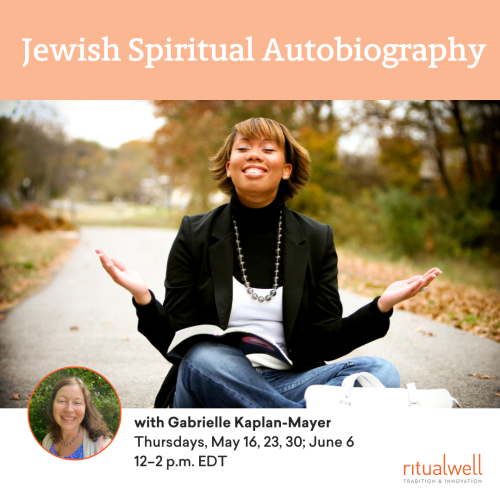The TorahThe Five Books of Moses, and the foundation of all of Jewish life and lore. The Torah is considered the heart and soul of the Jewish people, and study of the Torah is a high mitzvah. The Torah itself a scroll that is hand lettered on parchment, elaborately dressed and decorated, and stored in a decorative ark. It is chanted aloud on Mondays, Thursdays, and Shabbat, according to a yearly cycle. Sometimes "Torah" is used as a colloquial term for Jewish learning and narrative in general. spoke of four daughters:
One wise, one angry, one simple and one who knows not how to enquire.
The wise one, what says she?
‘What are the meanings of the testimonies, the statutes, and the ordinances, which our fathers and mothers passed down to you?’
Then you shall tell her: “Testimonies” – for our mothers, too, witnessed that same miracle. “Statutes” – for statutes were given to us to walk in their shade and to meditate in them, as it is said: “and I will meditate in Your statutes” (Psalms 119). “Ordinances” – for words, poetry, regenerating interpretation, betterment and tikkun, to which we are committed.
The angry one, what says she?
What do you mean by this service?
You spread your arms towards her and say: you, too, have part in this night of exodus, as it is said: “As the reward for righteous women … were the Israelites delivered from Egypt.” (Babylonian TalmudThe rabbinic compendium of lore and legend composed between 200 and 500 CE. Study of the Talmud is the focus of rabbinic scholarship. The Talmud has two versions, the main Babylonian version (Bavli) and the smaller Jerusalem version (Yerushalmi). It is written in Rabbinic Hebrew and Aramaic., Sotah 11 b), and therefore you deserve to have your voice sound rejoicing in the song of freedom, as it was said about MiriamMiriam is the sister of Moses and Aaron. As Moses' and Aaron's sister she, according to midrash, prophesies Moses' role and helps secure it by watching over the young baby, seeing to it that Pharaoh's daughter takes him and that the baby is returned to his mother for nursing. During the Israelites' trek through the desert, a magical well given on her behalf travels with the Israelites, providing water, healing, and sustenance. the prophetess: “and all the women went out after her with timbrels and with dances” (Exodus 15, 20).
The simple one, what says she?
What is this?
And you say to her: “In every generation man must regard himself as if he came out of Egypt”. ‘Man’ – each person, as it is said: “male and female created He them … and called their name Man” (Genesis 5, 2). “Himself,” why? As each and every one of us has an Egypt, which we are ordered to recognize, which we are ordered to exit, which we are ordered to expel from within us.
The one who does not know how to enquire
You open and tell her: “lift up your voice with strength; lift it up, be not afraid” (Isaiah 40, 9) “for sweet is your voice, and your countenance is comely” (Song of Songs 2, 14). Our power is diminished, and our conversation less worthwhile, without you.
“We will go with our young and with our old, with our sons and with our daughters, with our flocks and with our herds we will go; for we must hold a feast unto the Lord” (Exodus 10, 9) as we are all party to the exodus.
May we, in the joy of our freedom, be attentive to the voices of all people of the world.
NOTE: The Hebrew, below, is the original composition and intended primarily for our Israeli users. For the vocalized Hebrew text, click here.
כנגד ארבע בנות דברה תורה:
אחת חכמה, אחת כועסת, אחת תמה ואחת שאינה יודעת לשאול.
מאת הרבָּה דליה מרקסוהרבָּה תמר דבדבני
חכמה מה היא אומרת?
מה העדות והחוקים והמשפטים אשר הורישו אבותינו ואמותינו לכם?
אף אתם אמרו לה: ‘עדות’ – על שום שאמותינו היו גם הן עדות לאותו הנס. ‘חוקים’ – על שום שניתנו לנו חוקים לשוח בצלם ולהשיח בהם, שנאמר: “ואשיחה בחוקיך” (תהלים קיט). ‘משפטים’ – על שום: מלים, שירה, פרשנות מתחדשת, טיוב ותיקון, שאנומחויבים בהם.
כועסתמה היא אומרת?
מה העבודה הזאת לנו?
אף אתם פרשו ידיכם לקראתה ואמרו לה: גם לך חלק בליל יציאת מצרים הזה, שנאמר: “בשכר נשים צדקניות … נגאלו ישראל ממצרים” (בבלי, סוטה יא), וגם קולךראוי לו שיישמע מתרונן בשירת החירות, שנאמר על מרים הנביאה: “ותצאן כל הנשים אחריה בתפים ובמחלת” (שמות טו, 20).
תמהמה היא אומרת?
מה זאת?
ואמרתם אליה: “בכל דור ודור חיב אדם לראות את עצמו כאילו הוא יצא ממצרים”.
‘אדם’ – כל אדם, שנאמר: “זכר ונקבה בראם… ויקרא שמם אדם” (בראשית ה, 2).
‘עצמו’ מה טעמו? לכל אחד ואחת מאתנו מצרים, שאותה אנו מצווים להכיר, שאותה אנו מצווים לצאת, שאותה אנו מצווים להוציא מקרבנו.
שאינה יודעת לשאול
אתם פתחו ואמרו לה: “הרימי בכח קולך… הרימי אל תיראי” (ישעיה מ, 9) “כי קולך ערב” (שיר השירים ב, 14). כוחנו ייגרע וימעט שיחנו בלעדיך.
“בנערינו ובזקנינו נלך בבנינו ובבנותינו בצאננו ובבקרנו נלך כי חג ה’ לנו” (שמות י, 9). כי שותפים כולנו ביציאת מצרים.
מי ייתן ובשמחת חירותנו נהיה קשובים לקולות כל באי עולם.
Used by permission of the authors












